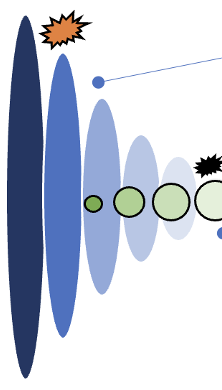Reviews: 5

Barriers and facilitators to the adoption and promotion of Open Science practices in psychology. The case of Slovakia
What are the barriers and facilitators to open science practices for researchers, policy makers and media representatives in Slovakia?
Recommended by Charlotte Pennington based on reviews by Crystal Steltenpohl, Peter Branney, Andrea E. Abele-Brehm , Emma Norris and 1 anonymous reviewerLevel of bias control achieved: Level 6. No part of the data or evidence that will be used to answer the research question yet exists and no part will be generated until after IPA.
List of eligible PCI RR-friendly Journals:
- Advances in Methods and Practices in Psychological Science
- Collabra: Psychology
- Meta-Psychology
- Peer Community Journal
- Studia Psychologica
- Swiss Psychology Open

Investigating the barriers and enablers to data sharing behaviours: A qualitative Registered Report
Capability, Opportunity, and Motivation in Data Sharing Behaviour
Recommended by Veli-Matti Karhulahti based on reviews by Moin Syed, Peter Branney and Libby BishopIn the present registered report, Henderson et al. (2023) empirically explore the factors that either hinder or facilitate data sharing in the UK. By means of semi-structured interviews, the team will chart researchers’ experiences of sharing and non-sharing. Thematic template analysis will be applied to organise the data into a hierarchical map of capabilities, opportunities, and motivations in a theoretical domains framework (COM-B-TDF). The research plan itself meets the highest open science standards and reflects on the authors own positions, from which the current qualitative interview data sharing efforts will be made.
The Stage 1 manuscript was reviewed over three rounds by three experts with familiary of the UK cultural context and specializations in open science practices, qualitative research, and data infrastructures. Based on careful revisions and detailed responses to the reviewers’ comments, the recommender judged that the manuscript met the Stage 1 criteria and therefore awarded in-principle acceptance.
URL to the preregistered Stage 1 protocol: https://osf.io/2gm5s (under temporary private embargo)
Level of bias control achieved: Level 6. No part of the data or evidence that will be used to answer the research question yet exists and no part will be generated until after IPA.
List of eligible PCI RR-friendly journals:
- Advances in Methods and Practices in Psychological Science
- Collabra: Psychology
- F1000Research
- Meta-Psychology
- Peer Community Journal
- PeerJ
- Studia Psychologica
- Swiss Psychology Open
1. Henderson, E., Marcu, A., Atkins, L. & Farran, E.K. (2023). Investigating the barriers and enablers to data sharing behaviours: A qualitative Registered Report. In principle acceptance of Version 3 by Peer Community in Registered Reports. https://osf.io/2gm5s
Life Thinning and Gaming Disorder: A Longitudinal Qualitative Registered Report
How do intensive gaming experiences evolve over time in clinical and non-clinical contexts?
Recommended by Chris Chambers based on reviews by Peter Branney and Michelle CarrasPhenomenological Strands for Gaming Disorder and Esports Play: A Qualitative Registered Report
The lived experience of gamers: a comparative qualitative investigation of treatment-seekers and esports players
Recommended by Chris Chambers based on reviews by Malte Elson and Peter BranneyPhenomenological Strands for Gaming Disorder and Esports Play: A Qualitative Registered Report
How does the phenomenology of "gaming disorder" differ from intensive but non-pathological videogame play?
Recommended by Chris Chambers based on reviews by Malte Elson, Peter Branney and Michelle CarrasIn this Stage 1 Registered Report, Karhulahti and colleagues (2021) propose a qualitative, interview-based study of videogame play, with the central aim to understand key phenomological differences between gaming behaviour that is associated with vs. without health problems. This question is particularly important given the recent inclusion of "gaming disorder" in the WHO's International Statistical Classification of Diseases and Related Health Problems (ICD).
In recent years, the validity of "gaming disorder" as an identifiable mental illness has been controversial (e.g. Van Rooij et al, 2018), as has the debate concerning purported harms or benefits of gaming for mental health. This Stage 1 manuscript describes a rigorous qualitative investigation that should provide new insights on this question, and will also include a longitudinal component to examine changes in phenomonology over time, as well as an examination of the extent to which the phenomonology of gaming is reflected in the experiences of medical experts such as doctors, nurses, and therapists who have worked with gaming-related health problems.
More broadly, the manuscript breaks new ground for Registered Reports, being one of the first to focus on qualitative methods, while also making use of the Programmatic submission track in which the approved Stage 1 manuscript is intended to produce two Stage 2 manuscripts focusing on different elements of the project.
Three expert reviewers with a variety of field-specialist and qualitative methodological expertise assessed the Stage 1 manuscript over two rounds of in-depth review. Following revision, the reviewers and recommender agreed that the manuscript met the Stage 1 criteria and therefore awarded in-principle acceptance (IPA).
URL to the preregistered Stage 1 protocol: https://osf.io/a2rwg
Level of bias control achieved: Level 4. At least some of the data/evidence that will be used to answer the research question already exists AND is accessible in principle to the authors (e.g. residing in a public database or with a colleague), BUT the authors certify that they have not yet accessed any part of that data/evidence.
List of eligible PCI RR-friendly journals:
References
- Karhulahti V-M, Siutila M, Vahlo J, Koskimaa R (2021) Phenomenological Strands for Gaming Disorder and Esports Play: A Qualitative Registered Report. PsyArXiv preprints, Stage 1 preregistration, in principle acceptance of version 1 by Peer Community in Registered Reports. https://doi.org/10.31234/osf.io/q53jz
- van Rooij AJ, Ferguson CJ, Carras MC, Kardefelt-Winther D, Shi J, Aarseth E, Bean AM, Bergmark KH, Brus A, Coulson M, Deleuze J, Dullur P, Dunkels E, Edman J, Elson M, Etchells PJ, Fiskaali A, Granic I, Jansz J, Karlsen F, Kaye LK, Kirsh B, Lieberoth A, Markey P, Mills KL, Nielsen RKL, Orben A, Poulsen A, Prause N, Prax P, Quandt T, Schimmenti A, Starcevic V, Stutman G, Turner NE, Looy J van, Przybylski AK (2018) A weak scientific basis for gaming disorder: Let us err on the side of caution. Journal of Behavioral Addictions, 7, 1–9. https://doi.org/10.1556/2006.7.2018.19



